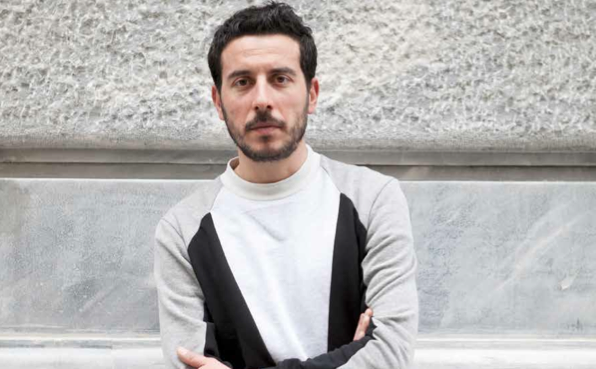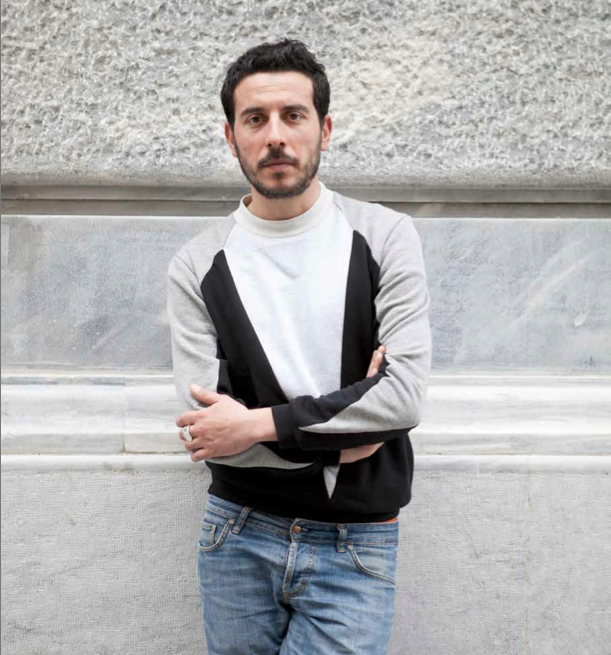Enke Fezollari came to Greece at the age of twelve, some twenty years ago. He was born on the Albanian side of Ohrid lake, in Pogradec. He moved to Tirana with his mother, a professor of the History of Communism and his father, a military man with studies in economics. In the summer of 1993, they move to Greece together and eventually, spurred on by his teachers in high school he sits the exams for the national theatre of Northern Greece, which he passes with flying colors. He is currently one of the most promising directors and actors in Greece.
What was the greatest difficulty that you faced as an actor and director?
To act in my native tongue. I felt completely naked and unprotected and so emotional at the same time. Eleni Aggelopoulou directed me in “To Parathiro” (the window) by Giannis Ritsos. As a director, my greatest difficulty was finding a producer to believe in my vision and provide me with the budget to make it happen.
You’re still very young and yet we see your name in the credits of a variety of important projects; sometimes two or three times in a single season. How does that make you feel, seeing as this takes place in the middle of the Greek crisis?
Lucky and proud after putting in all this work. Lucky, because there are people that trusted me and continue to do so, and not because I’m a “nice guy”, but because our artistic visions are similar. I owe the people I work with a lot, especially my actors. Without them, nothing would have happened.
Tell us a few things about “Skines apo ena gamo” (Scenes From a Wedding) and your collaboration with Danis Katranidis, Panagiota Vladi and Stamatis Kraounakis.
It was a real surprise for me to get to direct Danis Katranidis, an actor with a long career in both theatre and cinema and Panagiota who is such an established professional. Kraounakis is a hugely important figure in the music world. Generous and so full of emotion. I’d say this project has been a “joyous coincidence”.
You were recently in Sarajevo, with your show “Hecuba, Hekube, Hecube, Ekavi”, how did this come about?
During a festival in 2013, which ran under the banner of “the art of touch”, Greece participated with the List Project, an interactive installation of theatre and music, for which I received a director’s award. Greece’s participation this year coincides with our country standing at the helm of the European Union Council, and also with the thirty year anniversary of the Sarajevo Winter Olympics of 1984. The ‘Hecuba, Hekabe, Hecabe, Hecube, Ekavi’ project, is a multicultural theatrical and musical piece of work, based on Euripides’ Ekavi tragedy, with the participation of a number of Greek and immigrant artists. The show combines a variety of languages, as one gets to hear Greek, Albanian and African texts, as well as songs coming from all these national directions. Through the human point of view of all these participants and with the language of tragedy as its axis, the project seeks to answer the anguish born from the fear of the outsider, the foreigner, the immigrant and highlights the need for a very real meeting with the Other. The show is produced by the Highway company, who have worked closely with the Cultural Stand for Albanian Immgrants in Greece, within the context of the Festival of Cultures and made its initial run in 2012 at the Thision theatre.
Theirs is also something else that bears your name. Margarita Karapanos’ “Cassandra and the Wolf” plays at the Mihalis Kakogiannis foundation. How did you approach this book, in order to bring it to the stage?
The play is based on this very important literary treasure that Margarita Karapanos has given to us and with the help of the actors, we try and make some of its pages come to life on stage. Elli Merkouri holds down the role of Cassandra and Solonas Tsounis reveals the real and fantastic characters in Cassandra’s life, both comically and dramatically. We’re essentially dealing with a living, fantastical and autobiographical journal, on stage. The abstract videos, the choice of music and the playground complete the puzzle.
Interview: Nelly Skoufatoglou
Photo: Christos Tzimas





